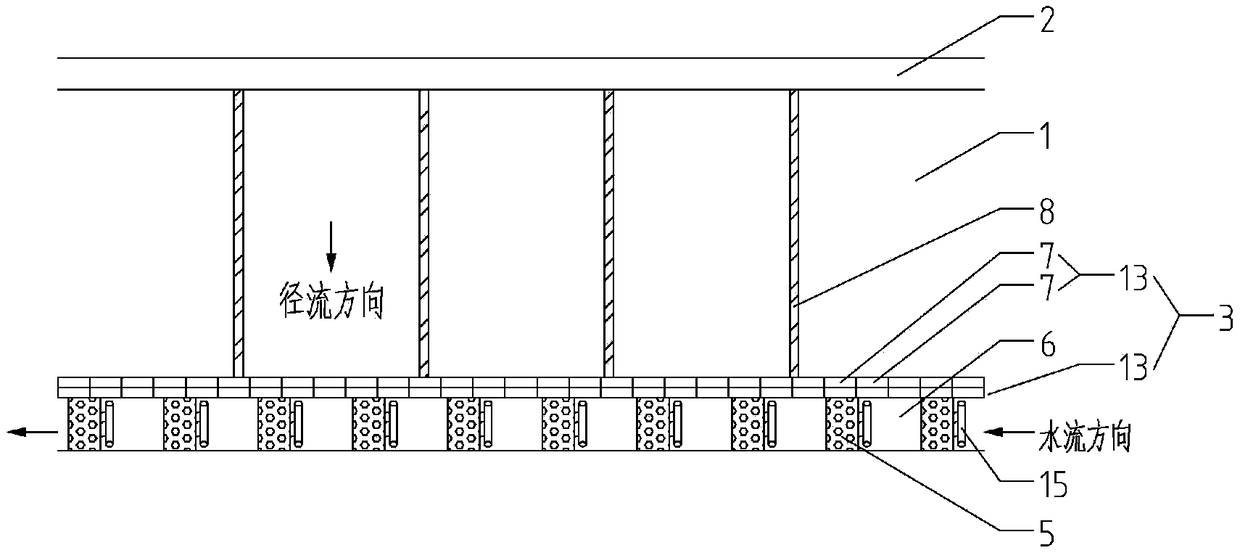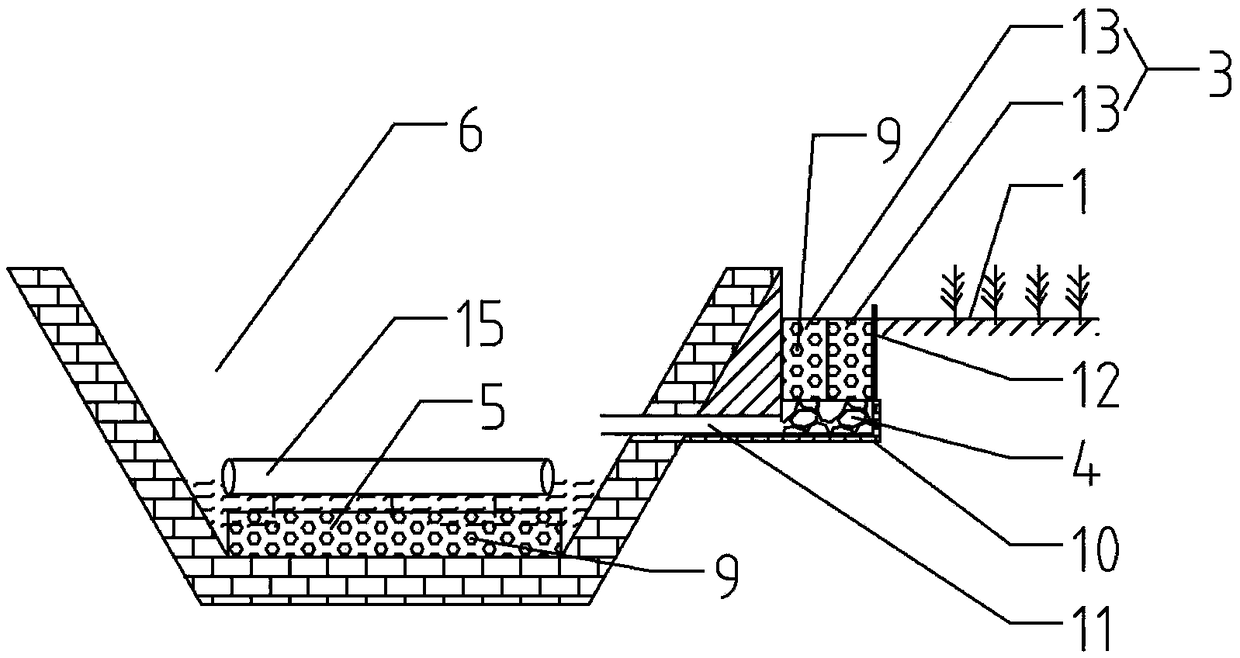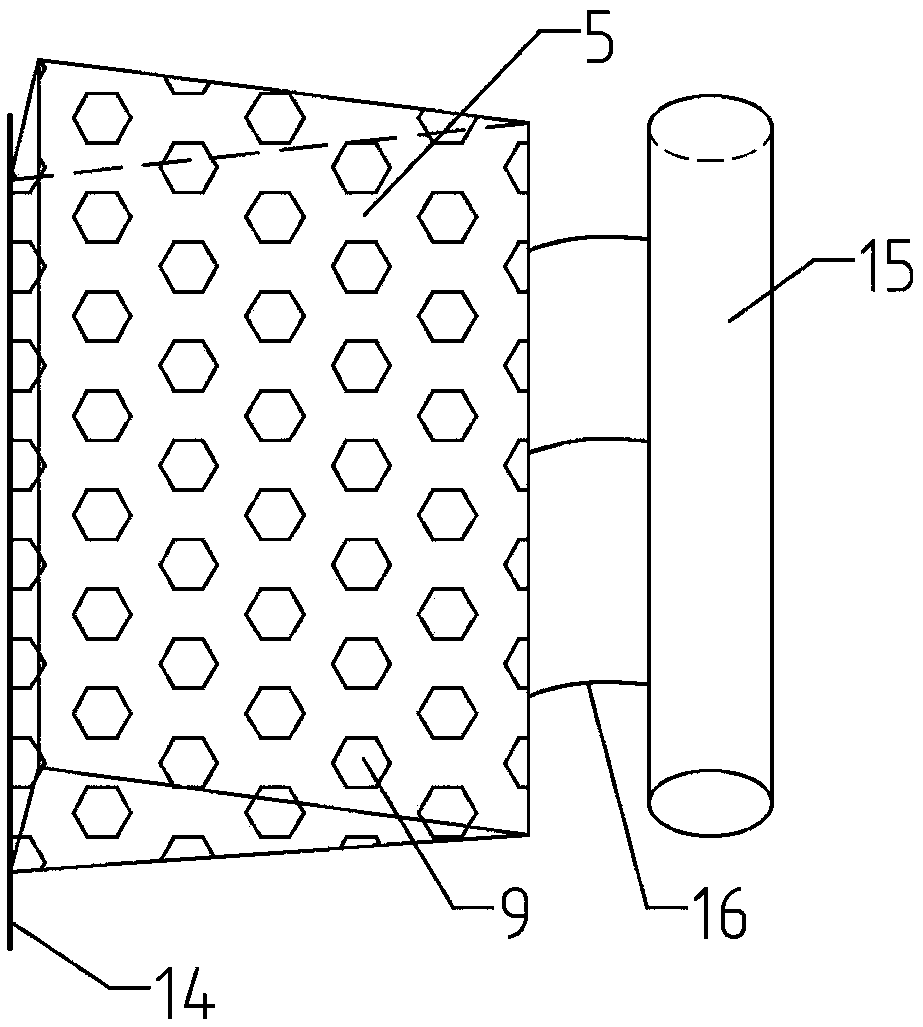Farmland non-point source pollution control system and method based on biomass charcoal and biomass vinegar
A technology of biomass vinegar and biochar, which is applied in botany equipment and methods, chemical instruments and methods, agriculture, etc., can solve the problems of secondary pollution of fillers, reduce pH value, and improve soil water and fertilizer retention Ability to reduce the effect of increasing ammonia volatilization
- Summary
- Abstract
- Description
- Claims
- Application Information
AI Technical Summary
Problems solved by technology
Method used
Image
Examples
Embodiment 1
[0064] The farmland is a rice-wheat rotation system, and the system is arranged before transplanting in the rice season. The amount of biochar added to the soil used to make the ridge is 1% of the dry weight of the soil; the length, width, and height of the biochar box 7 in the farmland are respectively 0.5 m, 0.2 m, 0.4 m; the thickness of the thick side of the ditch biomass carbon box 5 is 0.2 m, the width of the wedge is 0.7 m, and the length from the thick side to the thin side of the wedge is 0.6 m; the diameter of the buoyancy rod 15 is 0.2 m, and the length is 0.65 m; the partition 12 is 5 cm higher than the soil surface, which can keep the paddy field at a 5 cm high water layer.
[0065] After the system is installed for the first time, apply the base fertilizer and transplant the rice in a timely manner. The amount of fertilizer application, the frequency and time of fertilization are the same as the conventional fertilization management.
[0066] When the amount of irr...
Embodiment 2
[0073] The farmland is a double-cropping rice system (two rice crops a year) system, and the system is arranged before the spring-summer rice transplanting. The amount of biochar added to the soil used to make the ridge is 1% of the dry weight of the soil; the biochar box in the farmland The length, width and height of 7 are 0.5 m, 0.3 m and 0.5 m respectively; the thickness of the thick side of the wedge-shaped ditch biochar box 5 is 0.3 m, the width of the wedge is 1 m, and the length from the thick side to the thin side of the wedge is 0.7 m; the buoyancy The rod 15 has a diameter of 0.3 m and a length of 0.95 m; the partition 12 is 5 cm higher than the soil surface, so that the paddy field can maintain a 5 cm high water layer.
[0074] After the system is installed for the first time, apply the base fertilizer and transplant the rice in a timely manner. The amount of fertilizer application, the frequency and time of fertilization are the same as the conventional fertilizati...
Embodiment 3
[0081] The farmland is a summer corn-winter wheat rotation system. The system is arranged before the start of the corn season. Depending on the actual needs of the farmland, it is determined whether to make field ridges. The amount of biochar added to the soil used to make field ridges is 2% of the dry weight of the soil; The length, width and height of the box 7 are 0.5 m, 0.2 m, and 0.4 m respectively; the thickness of the thick side of the wedge-shaped ditch biochar box 5 is 0.2 m, the width of the wedge is 0.6 m, and the length from the thick side to the thin side of the wedge is 0.6 m; The buoyancy rods are 0.2 m in diameter and 0.55 m in length; the partitions are flush with the soil surface.
[0082] After the system is installed for the first time, apply the basal fertilizer and sow corn at the right time. The fertilizer application amount, frequency and time of fertilization are the same as the conventional fertilization management.
[0083] When the amount of irrigat...
PUM
| Property | Measurement | Unit |
|---|---|---|
| Thickness | aaaaa | aaaaa |
Abstract
Description
Claims
Application Information
 Login to View More
Login to View More - R&D
- Intellectual Property
- Life Sciences
- Materials
- Tech Scout
- Unparalleled Data Quality
- Higher Quality Content
- 60% Fewer Hallucinations
Browse by: Latest US Patents, China's latest patents, Technical Efficacy Thesaurus, Application Domain, Technology Topic, Popular Technical Reports.
© 2025 PatSnap. All rights reserved.Legal|Privacy policy|Modern Slavery Act Transparency Statement|Sitemap|About US| Contact US: help@patsnap.com



